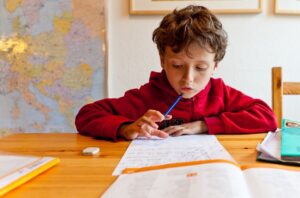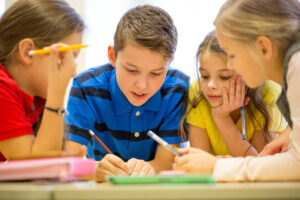
New Year’s vacations and 8th grade math book are a controversial phenomenon: it’s great to have them, and unpleasant to have to go back to the usual work rhythm after them. Adapting to a normal life where you have to get up for the alarm clock and do homework, rather than go out and have fun all day, can be a real challenge for your child. How can you make it easier to get back on track after a long holiday?
When we change our routine for a period of time, it can be very difficult to go back to it. During long New Year’s weekends adults usually sleep longer, go to bed later and let the children do the same. As a result, children’s biological clock gets disrupted: in the evenings, they still want to sit up late and play or watch TV, but in the morning it is very hard to get up for kindergarten or school. What can you do now to help your child, and what can you do during the next vacations to avoid such problems?
How to recognize problems with adaptation to the usual rhythm
Mood swings, unwillingness to go somewhere, problems with early awakening are typical consequences of a change in the daily routine. If during the first week after the vacation, or even on the eighth day, the child gets into a rhythm, then everything is normal and there is no need to worry. Usually, in order to get into the regime, a week and 4th grade science activities is enough, if not less.
But if it is the second or third week, and the child is still hard to get up, the rhythm is not adjusted in any way, all day he is sleepy, then here you need your intervention.
How to help him return from the holidays to everyday life
Create a gentle regime
If you criticize your child for the fact that he cannot get up for the alarm clock, or scold him for going to bed late, it will only increase his stress. It is important to help him or her control their routine and help them organize their day: picking up their school bag, doing their homework and other habitual activities. You may also need to be firm here – you need to clearly state that at a certain time a child should be getting ready for bed, and not reading or playing.
Reduce the workload
You can release your child from household chores for a while or reduce it, for a maximum of five days. If one of his duties is walking the dog, it should be left: after being outside, children usually feel better, more alert and sleep more soundly.
It is worth reducing even positive strain on the nervous system, such as sports sections. It may be advisable for a while, one or two weeks, not to go to classes or reduce them to once a week. When a child on vacation had 10 days of rest and fun, and then on the first day of school he has lessons from the morning, homework, and sections, it is natural that he has a hard time. Now a very popular trend to sign children up for all kinds of activities in a row, and no wonder that kids get tired and can not cope with such a load. And it’s harder to fit back in after a long break.
It is important to return to the usual routine gradually. This does not apply to lessons: homework should be done in the proper amount. You can help your child with this, but do not take it upon yourself, and in no way allow him to do nothing, no matter how tired he is. Otherwise he will be “tired” all the time.
Leave things that make your child happy
It’s not about gadgets: it’s better to limit them. When a child has no physical activity, and after school he sits for a few more hours – at the computer, in front of the TV, or on the couch with a tablet, it is very difficult for him to switch over, get up and make himself do something. I’m not talking about forbidding your child to approach gadgets at all, just agree that he can spend strictly limited time with them.
But what is worth making time for is going for walks and meeting with friends. For a child it is an outlet, especially in such a difficult period. But this also need a sensible approach. If your child wants to walk with friends outside until late at night, suggest he do it on the weekend, and tonight go to bed early to wake up more awake. If it’s someone else’s birthday, let your child go, even if the celebration drags on. After all, such a holiday comes only once a year. Communication and positive emotions – a resource that energizes children and helps them recover.
Enter the day sleep
Children who neglected in every way the day sleep in kindergarten, begin to appreciate it belatedly in school. An hour and a half of sleep after school will be enough for a child to recover a little. A longer nap during the day is more likely to be detrimental. Both children and even adults often feel broken and disoriented afterwards. In addition, it can also create problems with going to bed: if a child has slept three or four hours during the day, he is unlikely to want to go to bed at 9 p.m. A daytime nap is, after all, a last resort. It is better to “get home” and go to bed early.
How to prevent this problem in the future
The most logical way to help your child avoid the problem of adapting to “regular life” later on is to make sure that his next weekends and vacations are not very different from weekdays. For example, agree that he will not sleep until noon, and you will wake him up at most an hour and a half later than usual. The same applies to going to bed. Psychologically and physiologically, following a schedule is helpful, but we live in a non-ideal world and know that both adults and children often need to sleep or, conversely, to stay up late. This is normal, but it should not become a habit.
It will be useful if on the days off the child will not only play, but a little work, something to read, repeat from previously learned. After all, even an adult, if he has not opened the book he started reading for a week, it will be difficult to quickly grasp the essence and remember everything. Of course, you don’t have to turn vacations and weekends into full-fledged study days. Just half an hour or an hour a day for studying or just for useful pastime will help a child to get back into school life much faster. But this is only true if the child is not exhausted from studying. There are times when he really needs to forget about books, notebooks and sections.
It is important for a child to have at least some physical activity during the vacations: walks, housework. Maintaining physical activity is not only important for health, but also useful in terms of getting back on track.
Proper and responsive parenting is an important prerequisite for the timely adaptation of the child to school life. Support your child, listen to him or her and help him or her.